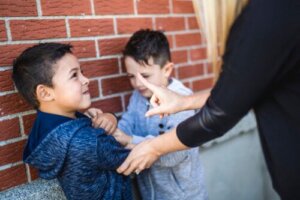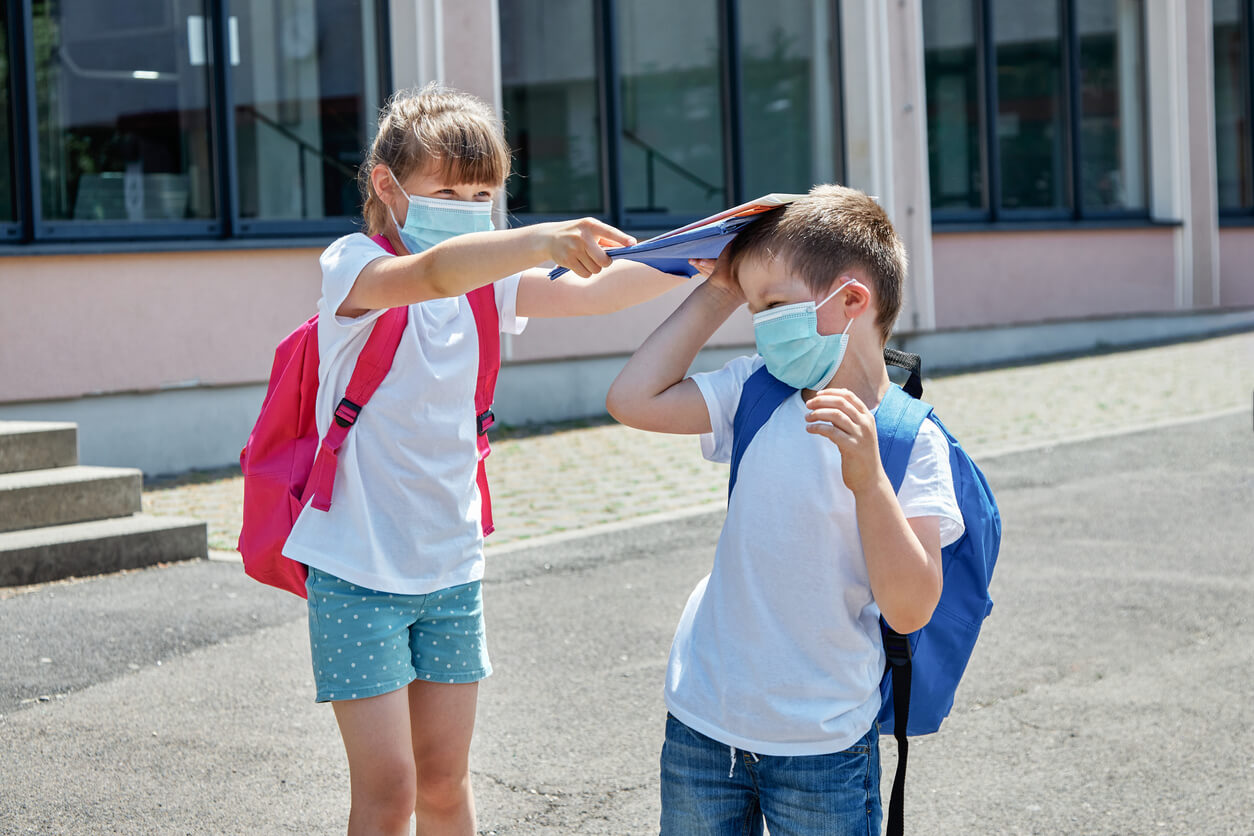What to Do When Another Child Hits Your Child?


Written and verified by the psychologist Elena Sanz Martín
It’s a priority for every mother to keep her child safe and make sure to protect them from harm or danger. So, when another child hits your child, you may feel angry and act in the wrong way. However, trying to stay calm, analyze the situation, and make thoughtful decisions is much more productive and beneficial.
Keep in mind that your reaction to aggression can make a difference in the long run. Your attitude can make the situation better or worse, empower your child, or make them feel weaker. Therefore, it’s important that you measure your steps carefully before intervening. Here are some steps that can help you in this situation.
Why does another child hit your child?
First of all, you need to identify the nature of the aggression, as the way to proceed will be different in each case. It’s one thing for a baby to hit a child as an act of exploration, and it’s another thing when another child does so because they don’t know how to manage their frustration. Similarly, both situations are very different from a child who systematically harasses and assaults another child at school.
In order to better identify the context, you can try to answer the following questions:
- Was this a one-time event or is it a recurring event?
- What’s the age and developmental level of the children involved?
- Is your child solely the victim or have they also contributed to the conflict?

How to act if another child hits your child?
If a child hits your child, it’s normal to feel confused, angry, or helpless. It’s not always easy to decide how to act in these cases. However, there are some guidelines that you should follow, which we’ll share below.
Have an open conversation with your child
Talking to your child is the first and essential step. Ask them to tell you their version of events in order to get relevant information about the event and get an idea of how to act. In addition, this way, you offer a valuable space for the child to express themself and their emotions. Narrating an event and expressing what you feel is extremely liberating. Therefore, be sure to give your child the confidence to come to you for help in this type of situation.
Avoid judgments
When your child tells you what has happened, avoid judging them. Instead, try to be compassionate and understanding. They may not have acted in the best way or may not have known how to react, but try not to blame or reproach them for it, as it will only make them feel humiliated and ashamed. Instead, focus on being supportive, being a safe place for your child, and looking for solutions.
Stay calm
If you witness another child hitting your child, your first instinct is likely to be to defend them and attack the child or their parents, as the case may be. Likewise, if your child tells you that they’ve been bullied at school, you’ll probably want to ask for explanations, and not in the best of ways. Even so, it’s important that you try to calm down so as not to transmit more distress and stress to your child. Try to regulate your emotions to help your child manage their own emotions.

Take action
Although you shouldn’t act impulsively, it’s important to take action. Your child needs to feel protected and supported by you. Assuming that it’s just kid stuff or that they should work it out between themselves isn’t the best alternative if the aggression has been significant or if it’s repeated systematically. So, if you see another child attacking your child, you can respectfully but firmly give them a wake-up call. Similarly, you can let their parents know what happened or talk to the school if the dispute occurred in that environment. In any case, talk to those responsible and don’t let the issue go undealt with.
Help your child to acquire tools
Finally, remember that protection isn’t synonymous with overprotection and that, ultimately, your child must be able to manage on their own. Therefore, it’s important that you reinforce their self-esteem, help them improve their social skills, and teach them to practice assertiveness. These resources can prevent new aggressions from occurring.
If a child hits your child, take the opportunity to educate them on values
In short, if a child hits your child, it’s important that you take measures proportional to what happened and that you provide the child with good emotional support. Knowing that they have the support of their parents, the child will be able to go through and overcome this situation in a better way. They’ll even learn or strengthen fundamental values in order to live in society.
It’s a priority for every mother to keep her child safe and make sure to protect them from harm or danger. So, when another child hits your child, you may feel angry and act in the wrong way. However, trying to stay calm, analyze the situation, and make thoughtful decisions is much more productive and beneficial.
Keep in mind that your reaction to aggression can make a difference in the long run. Your attitude can make the situation better or worse, empower your child, or make them feel weaker. Therefore, it’s important that you measure your steps carefully before intervening. Here are some steps that can help you in this situation.
Why does another child hit your child?
First of all, you need to identify the nature of the aggression, as the way to proceed will be different in each case. It’s one thing for a baby to hit a child as an act of exploration, and it’s another thing when another child does so because they don’t know how to manage their frustration. Similarly, both situations are very different from a child who systematically harasses and assaults another child at school.
In order to better identify the context, you can try to answer the following questions:
- Was this a one-time event or is it a recurring event?
- What’s the age and developmental level of the children involved?
- Is your child solely the victim or have they also contributed to the conflict?

How to act if another child hits your child?
If a child hits your child, it’s normal to feel confused, angry, or helpless. It’s not always easy to decide how to act in these cases. However, there are some guidelines that you should follow, which we’ll share below.
Have an open conversation with your child
Talking to your child is the first and essential step. Ask them to tell you their version of events in order to get relevant information about the event and get an idea of how to act. In addition, this way, you offer a valuable space for the child to express themself and their emotions. Narrating an event and expressing what you feel is extremely liberating. Therefore, be sure to give your child the confidence to come to you for help in this type of situation.
Avoid judgments
When your child tells you what has happened, avoid judging them. Instead, try to be compassionate and understanding. They may not have acted in the best way or may not have known how to react, but try not to blame or reproach them for it, as it will only make them feel humiliated and ashamed. Instead, focus on being supportive, being a safe place for your child, and looking for solutions.
Stay calm
If you witness another child hitting your child, your first instinct is likely to be to defend them and attack the child or their parents, as the case may be. Likewise, if your child tells you that they’ve been bullied at school, you’ll probably want to ask for explanations, and not in the best of ways. Even so, it’s important that you try to calm down so as not to transmit more distress and stress to your child. Try to regulate your emotions to help your child manage their own emotions.

Take action
Although you shouldn’t act impulsively, it’s important to take action. Your child needs to feel protected and supported by you. Assuming that it’s just kid stuff or that they should work it out between themselves isn’t the best alternative if the aggression has been significant or if it’s repeated systematically. So, if you see another child attacking your child, you can respectfully but firmly give them a wake-up call. Similarly, you can let their parents know what happened or talk to the school if the dispute occurred in that environment. In any case, talk to those responsible and don’t let the issue go undealt with.
Help your child to acquire tools
Finally, remember that protection isn’t synonymous with overprotection and that, ultimately, your child must be able to manage on their own. Therefore, it’s important that you reinforce their self-esteem, help them improve their social skills, and teach them to practice assertiveness. These resources can prevent new aggressions from occurring.
If a child hits your child, take the opportunity to educate them on values
In short, if a child hits your child, it’s important that you take measures proportional to what happened and that you provide the child with good emotional support. Knowing that they have the support of their parents, the child will be able to go through and overcome this situation in a better way. They’ll even learn or strengthen fundamental values in order to live in society.
All cited sources were thoroughly reviewed by our team to ensure their quality, reliability, currency, and validity. The bibliography of this article was considered reliable and of academic or scientific accuracy.
- Ferreira, Y., & Reyes Benitez, P. M. (2011). Programa de Intervención en Habilidades Sociales para reducir los niveles de acoso escolar entre pares o bullying. Ajayu Órgano de Difusión Científica del Departamento de Psicología UCBSP, 9(2), 264-283.
- Conners‐Burrow, N. A., Johnson, D. L., Whiteside‐Mansell, L., McKelvey, L., & Gargus, R. A. (2009). Adults matter: Protecting children from the negative impacts of bullying. Psychology in the Schools, 46(7), 593-604.
This text is provided for informational purposes only and does not replace consultation with a professional. If in doubt, consult your specialist.








